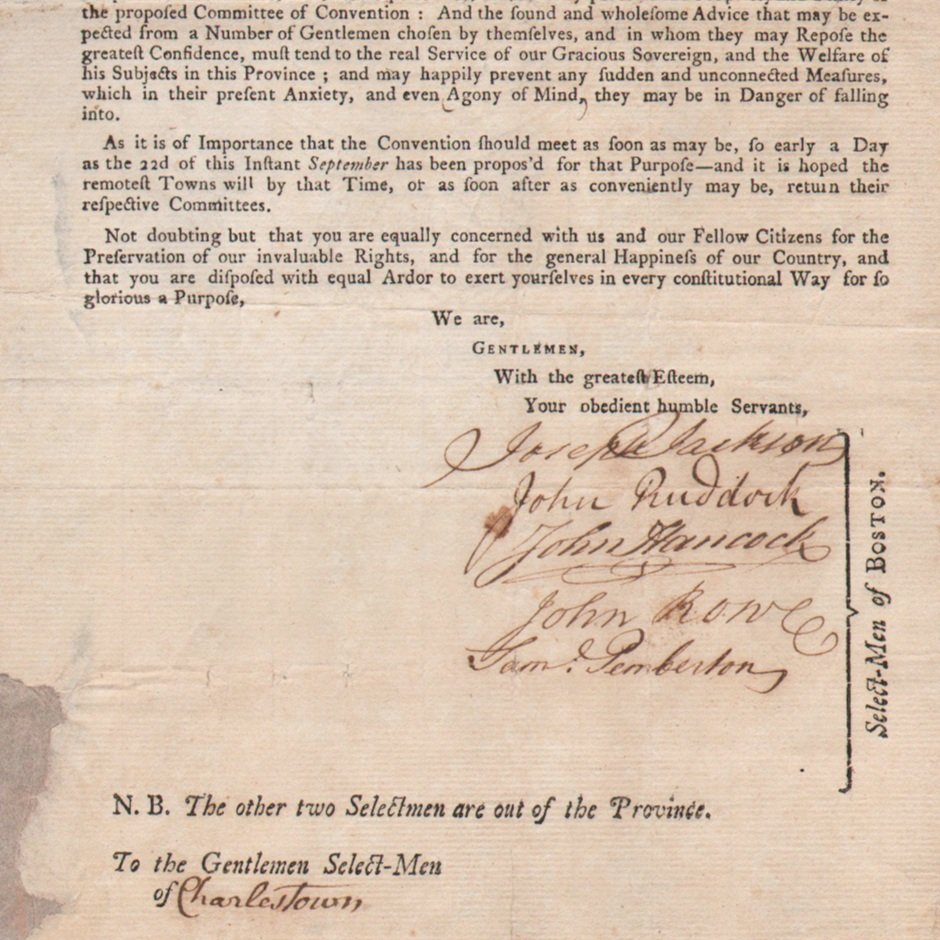 Image 1 of
Image 1 of

John Hancock’s Signed Protest Against Taxation Without Representation
Description With its warning call for “the Preservation of our invaluable Rights” punctuated by the instantly recognizable signature of John Hancock, this 1768 letter is an important precursor to American independence. The selectmen of Boston lay out key issues: the “unconstitutional” imposition of taxes, obstruction of petitions for redress, dissolution of representative government, and introduction of a standing army to enforce the oppressive mandates—“one of the greatest Distresses to which a free People can be reduced.”
The call for a convention was answered immediately. Nine days later, on September 23, representatives from 96 Massachusetts towns met in Boston’s Faneuil Hall. Five days after that, warships arrived in Boston Harbor with the first British reinforcements. The convention hastily composed a list of grievances, passed several resolutions, and adjourned. On September 30, royal transports unloaded two regiments at the Long Wharf, beginning the British military occupation of Boston that lasted until March 17, 1776.
“No taxation without representation.” is now thought of as the catchphrase for the patriot cause. Though often attributed to James Otis, no proof of his use of the phrase has been found. The February 1768 London Magazine contains the earliest known printing, in a subhead introducing a speech on the declaratory bill. Lord Camden stated that “taxation and representation are inseparably united,” and the editor added “no taxation without representation.” The first known usage relating to America was printed in 1771 for the prior year’s The Political Register and Impartial Review, in “A Dissertation on the original Dispute between Great-Britain and her Colonies,” by Demophoon.
The substance of the rallying cry is captured here, in the argument of Hancock and his fellow selectmen that the punitive taxes have been imposed on the Colonies “without their Consent,” through “Acts of Parliament in the forming of which the Colonies have not, and cannot have any constitutional Influence.”
The Boston selectmen’s circular letter, with its successful call for a colony-wide convention, represents an important precedent for the creation of ad hoc governing institutions in revolutionary America, from the Committees of Correspondence and Committees of Safety to the Continental Congresses. In bypassing royal prerogative to constitute a political body capable of representing the popular will, Massachusetts patriots sowed the seeds for republican government and independence in America.
Very rare. Only one other signed copy is presently known in private hands, and just four are recorded in institutional collections. It seems likely that many other copies went out with clerical signatures.

★ John Hancock Document Signed & Cosigned by Boston Selectmen Joseph Jackson, John Ruddock, John Rowe, and Samuel Pemberton. Boston, Mass., September 14, 1768. 1 p. 6 3/8 x 12 5/8 in. #27558
